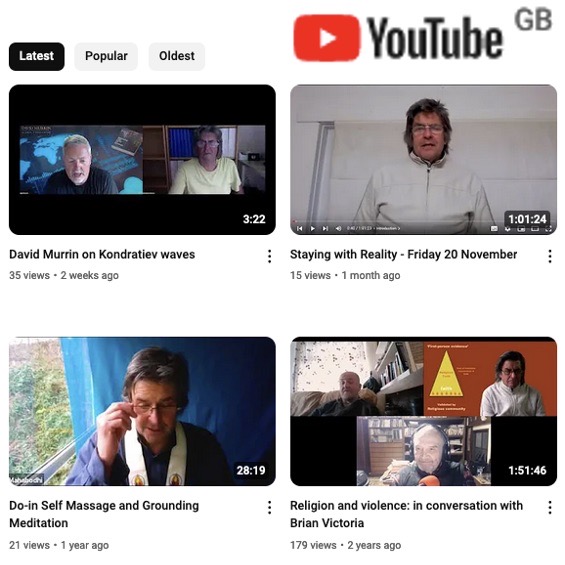The history of Cultural Marxism
Below is an excerpt from my forthcoming book… © Mahabodhi Burton 4 minute read This excerpt is from Chapter 4: ‘Postmodernism and the academic mindset’ and follows on from Critical Race Theory. Cultural Marxism Next, Lindsay goes into the history of the development of Cultural Marxism: we had a Russian Revolution in 1917 but the revolution did not spread to Europe: which confused the Marxists there. Antonio Gramsci:[1] founding member and one-time leader of the Italian Communist Party, and George Lukacs: the Hungarian Marxist philosopher who published History and Class Consciousness[2] after the failure of the revolution in Hungary in 1919, wrote about what became Cultural Marxism:[3] ‘the idea that we have to enter the cultural institutions in order to change them from within, because Western culture has something about it that’s repelling socialism. So we have to go inside and change the culture to make it socialist.’[4] Cultural Marxism evolved out of economic Marxism, Lindsay says, ‘like a virus adapted to infect a new host.’ Marxist revolution had worked in agriculturally-driven feudal societies: it had taken over in Russia, and later in China: but when it came to actual capitalist nations there seemed to be a hurdle, because, as Max Horkheimer proposed, Marx was wrong about one thing: capitalism does not immiserate the worker, it allows him to build a better life. Horkheimer thought the Revolution wouldn’t happen with guns, but through cultural infiltration: ‘… rather it will happen incrementally, year by year, generation by generation. We will gradually infiltrate their educational institutions and their political offices, transforming them slowly into Marxist entities as we move towards universal egalitarianism. So I developed the critical theory because it is not possible to articulate the vision of a good society on the terms of the existing society, so critical Marxism criticizes the entirety of the existing society, everything is somehow needing to be subjected to Marxist conflict analysis.’[5] Several Germans from the Frankfurt School started to study this phenomenon in more depth and evolved the idea further: into what’s called Critical Theory. ‘Max Horkheimer first defined critical theory in his 1937 essay “Traditional and Critical Theory”, as a social theory oriented toward critiquing and changing society as a whole, in contrast to traditional theory oriented only toward understanding or explaining it. Wanting to distinguish critical theory as a radical, emancipatory form of Marxist philosophy, Horkheimer critiqued both the model of science put forward by logical positivism, and what he and his colleagues saw as the covert positivism[6] and authoritarianism of orthodox Marxism and Communism.’[7] Thus, there evolved what’s called Critical Marxism: Horkenheim assumes that ‘the weak’ have no choice but to submit :...
Critical race theory
Below is an excerpt from my forthcoming book… © Mahabodhi Burton 5 minute read This excerpt is from Chapter 4: ‘Postmodernism and the academic mindset’ and follows on from Woke as Maoism with American Characteristics. Whiteness as Property In 1993, James Lindsay explains, Cheryl Harris wrote a long article for the Harvard Law Review called ‘Whiteness as Property,’[1] in which she proposed that whiteness or white privilege constitutes a kind of cultural private property. In The Communist Manifesto, Marx said that communism could be summarized in a single sentence: ‘the abolition of private property.’ This is why critical race theory thinks whiteness must be abolished in order to have racial justice. Lindsay: ‘People who have access to this property are whites, or white adjacent, or they act white. … People without that are people of colour and they are oppressed by systemic racism. Systemic racism is enforced by an ideology of white supremacy. Instead of capitalism, if you think of whiteness as a form of cultural capital, white supremacy, as they define it, is identical to capitalism. ‘It’s not believing that white people are superior, it’s believing that white people have access to the control of society and should maintain that. Even if you don’t actually believe that, if you merely support that, you have adopted the ideology of white supremacy into your mind. And so, you have the exact same system. And the goal is to awaken a racial consciousness in people so that they will band together as a class and seize the means of cultural production, so that white cultural production is no longer the dominant mode. ‘I know in the UK, throughout Europe, I hear this question again and again, why on Earth is this very American phenomenon about slavery and so on, that doesn’t apply to our country, why is it popular here. It’s because it’s not about history at all, it’s not about slavery at all, those are excuses that they use. It’s about creating a class consciousness that’s against this form of property called whiteness, that’s against the dominant culture. That may just be a matter of fact, say if you’re in Europe, that’s why because it becomes a site by which people can come together, and they can channel resentment and try to claim power.’[2] Recapping James’ points, Jake says: that ‘Marxism transcends economics, and even transcends social theory, the theory of Marxism bears a religious-like structure that can be extrapolated across all domains of life. And he used the example of private property, which if taken literally means a physical asset but that idea can be extrapolated to the idea of whiteness as...
Woke as Maoism with American characteristics
Below is an excerpt from my forthcoming book… © Mahabodhi Burton 7 minute read This excerpt is from Chapter 4: ‘Postmodernism and the academic mindset’ and follows on from Ideas without a Ground. James Lindsay European Parliament talk James Lindsay, author of Cynical Theories and Race Marxism– recently gave a talk at the European Parliament on Woke Ideology, which Jake from Rattlesnake TV comments on in his YouTube video James Lindsay SHATTERS Woke Ideology: EU Parliament Speech.[1] Lindsay’s thesis is as follows: He says Woke is supposed to advance equity in Europe, and he presents the definition of equity written by a man named George Frederickson: ‘an administered political economy in which shares are adjusted so that citizens are made equal’[2] and asks if it sounds like a definition of anything else we’ve ever heard of, like socialism. ‘They’re going to administer an economy to make shares equal.’[3] ‘The only difference between equity and socialism is the type of property that they redistribute, the type of shares they’re going to redistribute, social and cultural capital in addition to economic and material capital and so this is my thesis: when we say what is woke, woke is Maoism with American characteristics. If I might borrow from Mao himself, who said to his philosophy was Marxism Leninism with Chinese characteristics, which means woke is Marxism and it’s a very provocative statement. It’s something you will certainly hear. It is not that it is different, and the professors and the philosophers will spend a large amount of time explaining to you why no, no, it’s about economics when it’s Marxism.’[4] Lindsay claims that Woke is no different from Marxism: he says that when we study animals we classify them at different levels: the cat is at the level of genus, but within that genus are all the different species of cat: lions, tigers, leopards and so on, suggesting that: ‘If we think of Marxism as a genus of ideological thought, the classical economic Marxism is a species, radical feminism is a species in this same genus, critical race theory is a genus, or sorry, a species in this genus. Queer theory is a species in this genus, postcolonial theory that’s plaguing Europe is a species in this genus, and they have something that binds them together called intersectionality, that makes them treat it as if they are all one thing, but the logic is Marxist.’[5] Jake provides context: ‘Karl Marx was a 19th century philosopher who wrote The Communist Manifesto and Das Capital and his work obviously inspired the revolutions led by Vladimir Lenin, Chairman Mao, Pol Pot and more. …’ ‘… the idea of...
Black Lives Matter
Below is an excerpt from my forthcoming book… © Mahabodhi Burton 15 minute read This excerpt is taken from the chapter ‘The Woke Mind Virus‘ and follows on from The Woke Mind Virus post. The origin story of Black Lives Matter (BLM) The term ‘Woke’ came into common usage around the middle of President Obama’s second term, circa 2014. Within the black community it originally signalled, ‘to stay alive to sensitive social issues, including racism.’ However, after the shooting of Michael Brown,[1] an African American teenager by a police officer in Ferguson, Missouri that year, the term came to be popularized by BLM activists seeking to raise awareness about police shootings of African-Americans.[2] Since that date, similar incidents have continued to occur, in what Michael Mascarenhas, speaking in 2022, puts down to ‘environmental racism:’ ‘The fatal encounters of George Floyd, Ahmaud Arbery, and Trevyon Martin, to mention only three of the thousands of deaths of people of colour at the hands of White people each year is a form of environmental racism. Their crime was being in the wrong place at the wrong time. The death of Treyvon Martin was in part normalized because a Black teenage boy was walking in a White gated neighbourhood. Before fatally shooting the Black teenager, White neighbourhood watch captain George Zimmerman called 911 and reported a suspicious person in the neighbourhood. Similarly, Eric Garner was simply standing in front of a beauty supply store on Bay Street in Tompkinsville, Staten Island, when he was approached by New York Police Department police officers and strangled to death. Similarly, the deaths of Michael Brown in Ferguson, Missouri; Walter Scott in North Charleston, South Carolina; Freddie Gray in Baltimore, Maryland; and Philando Castile in Falcon Heights, Minnesota, represent just a few more tragic examples of over policing in Black and Brown communities. When found in White spaces, the colour of one’s skin is a key determinant of their experience. The Amy Cooper incident, where a White woman who called the police on Christian Cooper, a Black man, in Central Park, New York, after he asked her to leash her dog is one of the most recent striking examples of this form of environmental racism. Moreover, in most of these fatal cases–the coroner ruled Eric Garner’s death a homicide– predominantly White juries failed to bring charges against the White offenders. In fact, one of the potential jurors in the Treyvon Martin case said: “This could have been prevented had he not been up here,” had this Black youth not been in this White neighbourhood.’[3] After the Ferguson shooting BLM transitioned from...








 Users Today : 72
Users Today : 72 Users Yesterday : 23
Users Yesterday : 23 This Month : 530
This Month : 530 Total Users : 13957
Total Users : 13957
